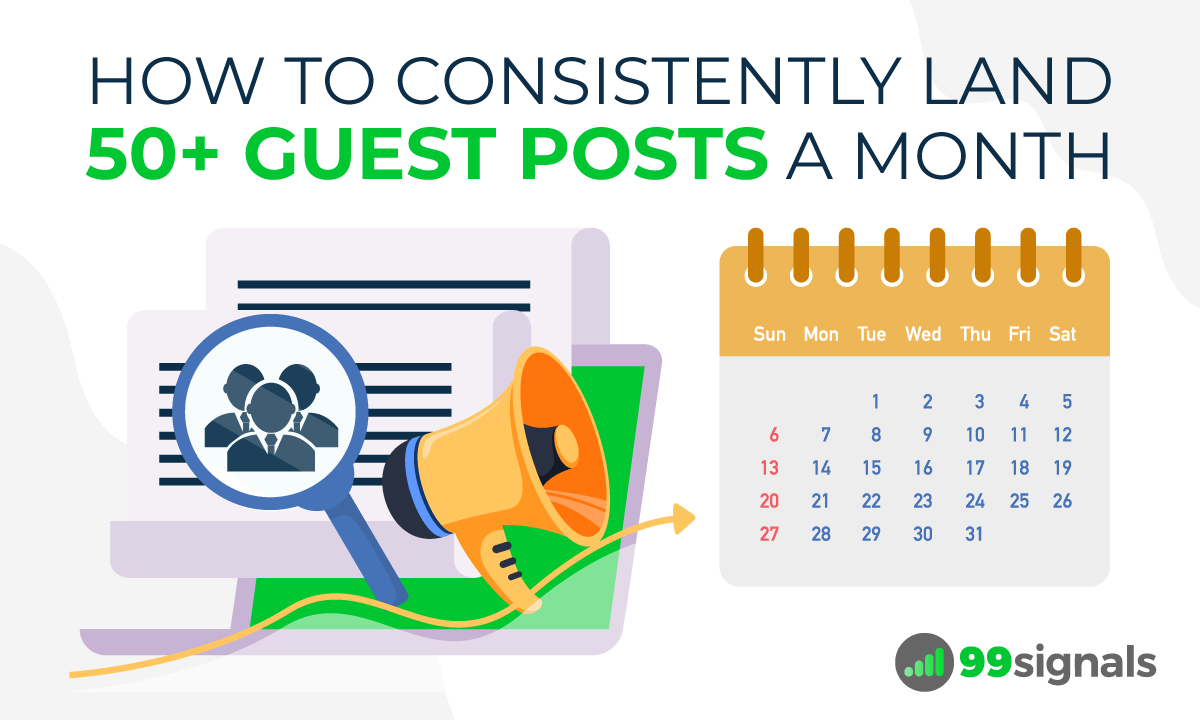
We all want to arrive on the first page of the SERPs for terms that are important to our businesses. If we do that, we earn money. It's that simple. Google is a multi-billion dollar company precisely because they offer companies the shortcut of paying for ad space to arrive on the front page.
Getting on the front page of Google is no easy task. There are just ten spots available. There are a lot of factors that go into making a piece of content rank. One of the most important is the number of backlinks.
In this guide, I'll share the system I use to land my clients up to 50 guest posts a month. I've applied this exact strategy, which took me over 12 months to perfect, across various niches.
Table of Contents
Why Backlinks Will Always Be Important
After a couple of years in SEO, my thoughts on SEO can be distilled down to a few sentences. Google is essentially the world's best betting algorithm. Every day millions of websites are placing bets to get their content to rank. The things they do to get their content to rank varies.
Google can't fit all of the pages competing for a term on the first page. It would get messy.
One of the most important things Google looks at to decide if content should appear on that first page is the number of referring domains. The more quality links a piece of content gets, the higher you get in the search results.
Ahrefs, an SEO tool, built this equation into their UI.
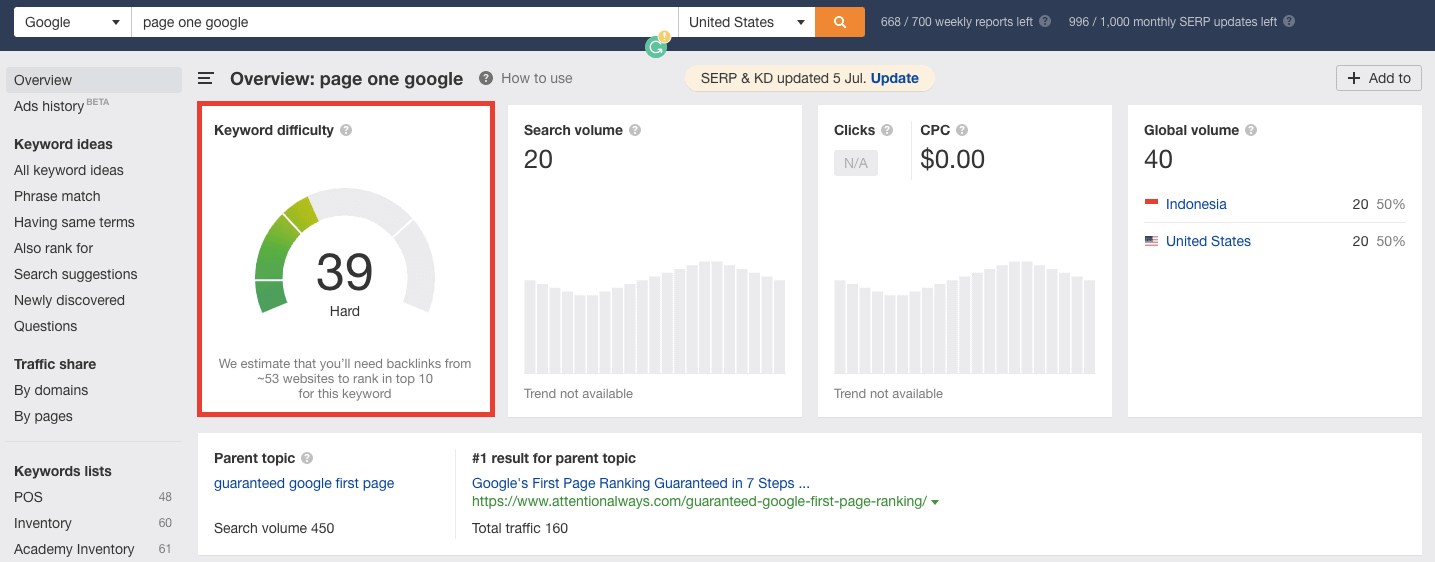
Once you've arrived on the front page of Google, the algorithm starts to focus on the User Experience (UX). That is, what do people do when they arrive on your page. Google can't make this computation before you arrive on the front page because nobody sees your content. That's why people in SEO joke that "the best place to hide a dead body is on the second page of the search results."
Regardless of what the folk at Google say, backlinks will always play a part in getting your content to the front page. I don't see an alternative.
Want proof? Here's a snapshot of the SERP rankings from Ahrefs for the term "business development." It's a competitive term with 19,000 searches in the US every month.
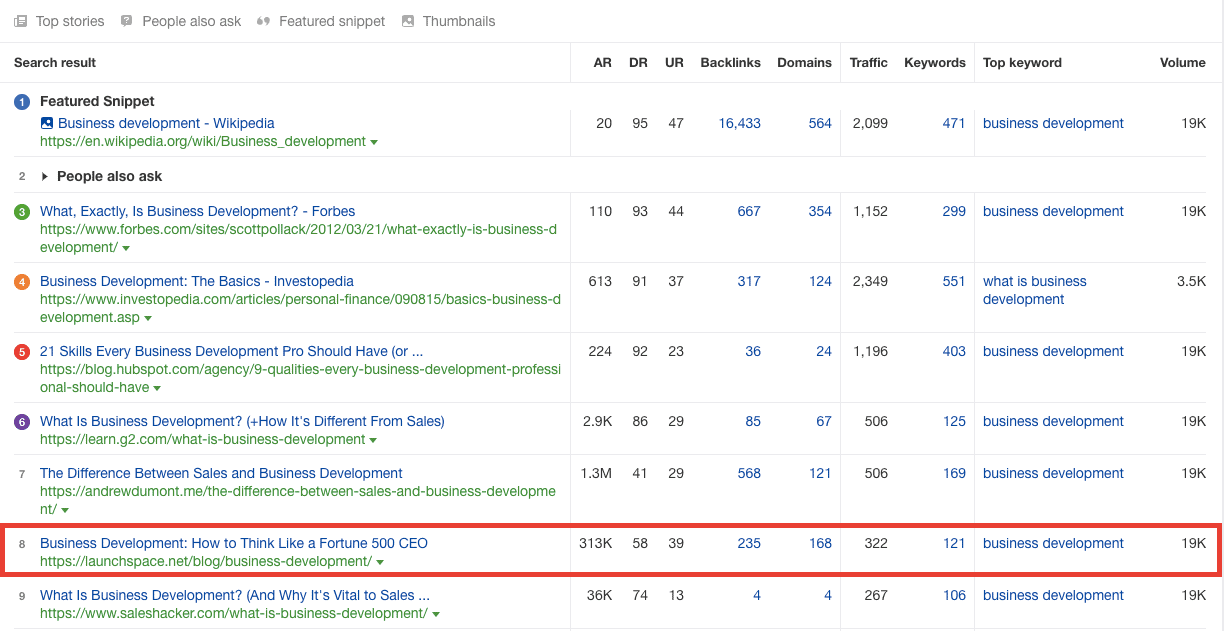
You can see my site, Launch Space, is ranking in eighth place for this term. The article has links from 168 referring domains. The majority of these links were generated through guest posts.
I wouldn't be on that first page without those links.
Now there's a lot more to ranking in the first place than backlinks. But to get on the first page, that wouldn't have happened without those referring domains.
If you wanted, I could give you endless examples of the link between the number of quality backlinks and where a content ranks in the SERPs. Really, we could be here all day. But to save my time and yours, let's agree that backlinks are important.
With that in mind, let me share the meat of this article with you, which will help you on your quest to make money blogging. You're going to get that juicy goodness that is one year of lessons learned the hard way, expensive mistakes, thousands of dollars in misadventures, and a few gold nuggets. Let's dive right in.
What Type of Links Should You Target
Let's start with the basics.
Getting your content to rank on Google requires links. However, not all links are created equal. You need to get high quality links. Here are the four most important factors you should review when assessing backlink quality:
- Relevance: is the website in a niche that is relevant to yours. A quick check of the website will help you establish this
- Authority: What is the sites Domain Rating (DR) or Domain Authority (DA). I never pitch to a site with a rating lower than DR 50
- Traffic: How many visitors does the website get a month. The more visitors, the more valuable the link
- Trust Flow: This is an SEO term for ranking the trustworthiness of the links. The lower the Trust Flow, the more paid or spammy links they have. I aim for a 20+ Trust Flow.
These are the four more important factors to review when assessing backlink quality. There are two secondary factors you might want to consider. They are:
- Follow vs. Nofollow: Most SEO folk only want to collect follow links. In general, I don't care so much, but I have a preference for a follow link over a nofollow link
- How Many Outgoing Links: The more outgoing links, the less value the link will have.
That in a nutshell is how I assess backlink quality.
Always try to get the most powerful links from authority sites in your niche. The more powerful the link, the faster your content will rank. Case in point, here's a site that leveraged a crazy amount of links from a DR 91 site to some core articles.
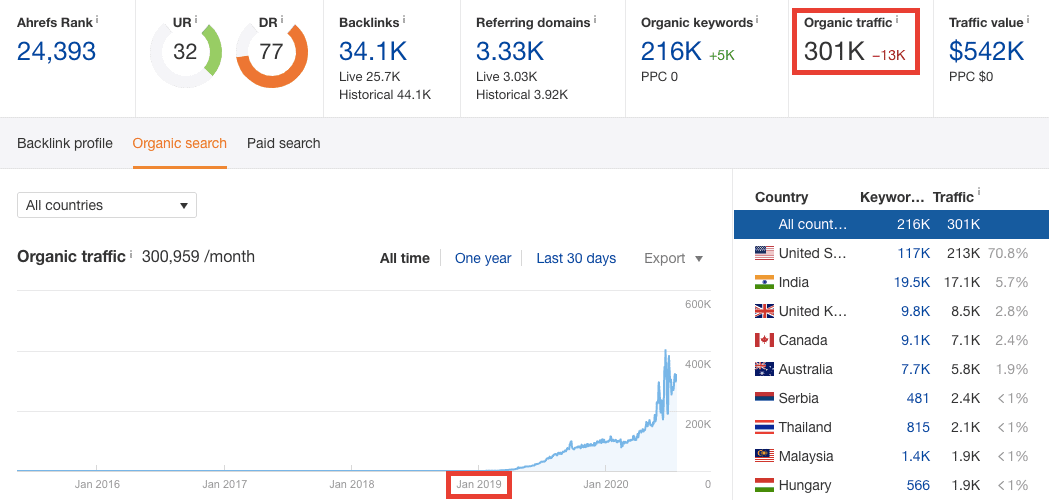
Now we've covered how to assess backlink quality. The next thing you should consider is how many links from unique domains you'll need to get your piece of content ranking. If you know this figure, you can set a benchmark for your guest post campaign.
How Many Links Will You Need to Get Your Content Ranking
Setting benchmarks is essential. There's nothing worse than running a race when you don't have an idea of the finishing line.
As I showed you earlier, tools like Ahrefs can help you set benchmarks on how many links from different domains you need to get a piece of content ranking. However, to figure out what it takes to rank in a specific position will require a bit more research.
I always analyze the backlink profile of the ranking content on Google and use this formula:
Referring domains (DR 50+) 1/4 of referring domains (DR <50) = Number of guest posts to rank
Remember that this is not an exact science. Moreover, the number of high-authority referring domains is not the only factor influencing your Google search ranking.
Next up, you need to build a list of target sites.
How to Find Thousands of Guest Post Opportunities
There are a bunch of ways to find guest post opportunities. The way I do it is straightforward.
First, pick an authority website in your niche. I'll choose Hotjar.
Enter the URL of the site in Ahrefs, and then select referring domains from the menu. Finally, export the list of referring domains to a Google sheet. Then, delete all of the sites with a DR of less than 50.
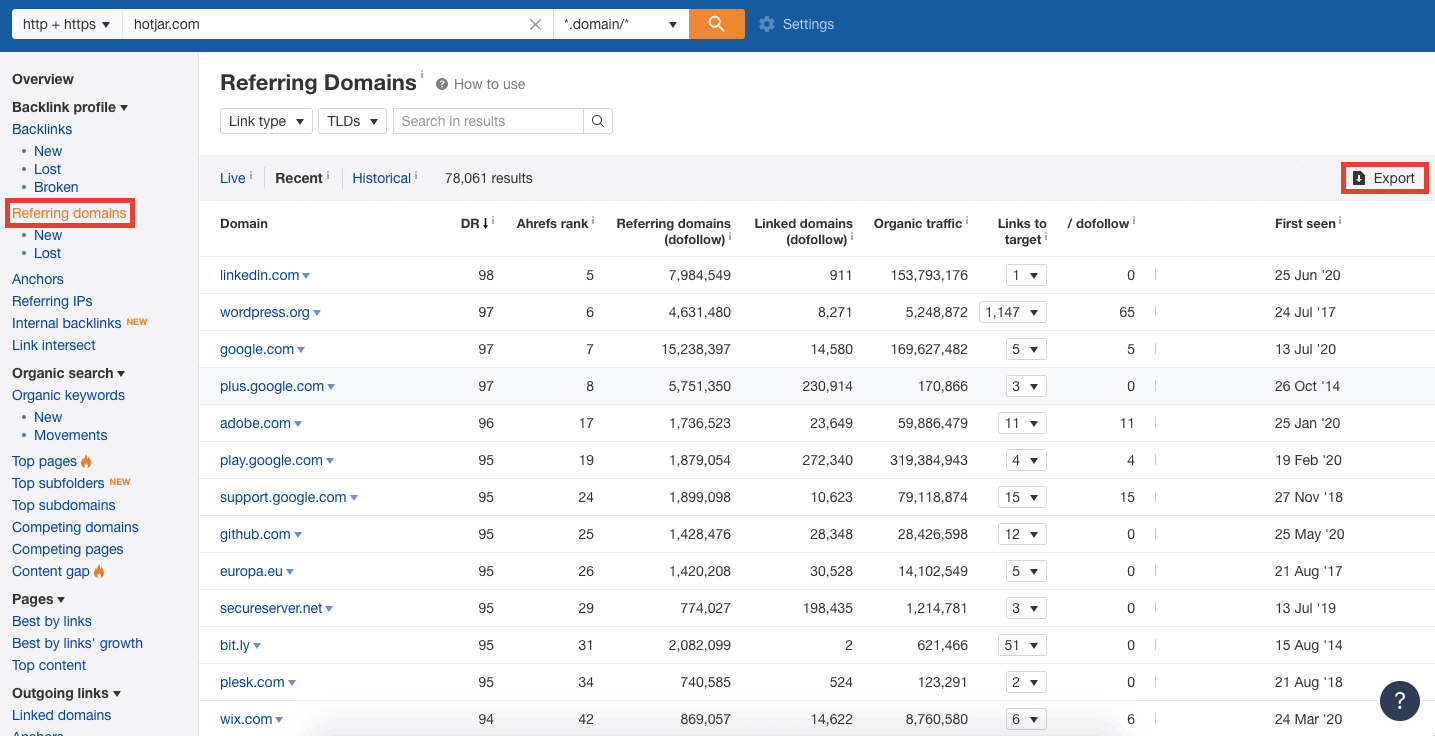
You can then either manually review these sites or use a tool like Majestic to separate the sites by niche, and subsequently remove sites with a low Trust Flow. Automation is faster, but you'll end up at the same point if you manually review the domains.
Complete those steps I mentioned above, and you'll end up with a list of hundreds of relevant domains that you can email for a guest post — next step.
Do Email Outreach to Content Editors
With your shortlist prepared, it's time to start reaching out to editors. I use a combination of LinkedIn and email outreach to contact editors. I'll start with LinkedIn, as it's used less often.
Assuming you have a LinkedIn account, head over to your account. Enter the details of the site you want to write for, click on the People tab, and search for the position "editor" or "writer". You can then add this person to your LinkedIn network. If they accept, ask them how to pitch a guest post.
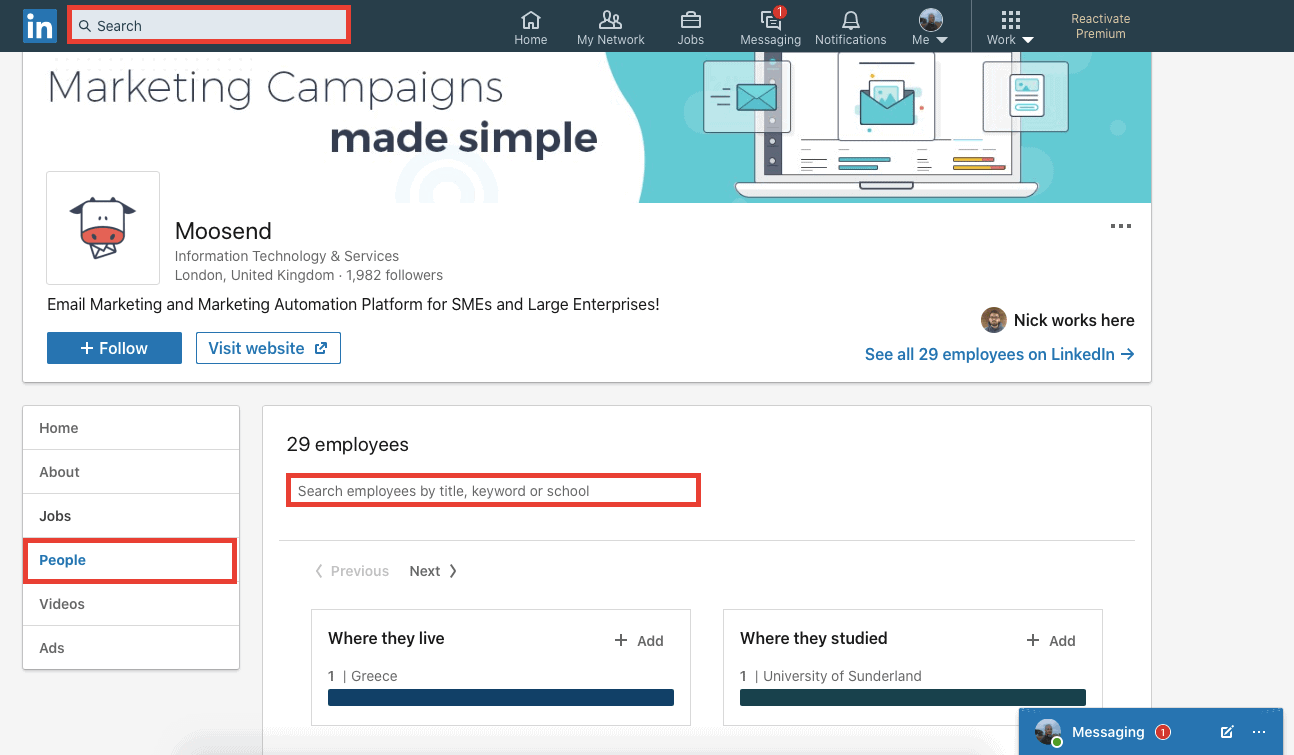
LinkedIn is a great option for authority sites. For the mid-range sites, I use email outreach. If you can't find the editor's email address, use a tool like FindEmails or Voila Norbert to get their contact information.
Finally, send across that outreach email.
Writing a good outreach email template sounds easy. However, a lot of people get it wrong. Here's one such example.
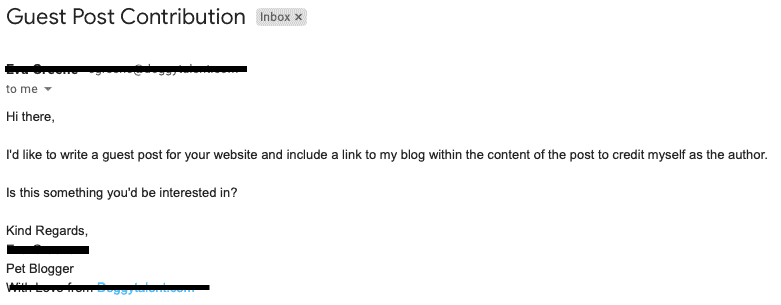
There's no real connection. The person doesn't explain why they'd be a good fit for the site or provide examples of content they've written in the past.
A good outreach email sidesteps these issues. Here's an example of a template I've used.
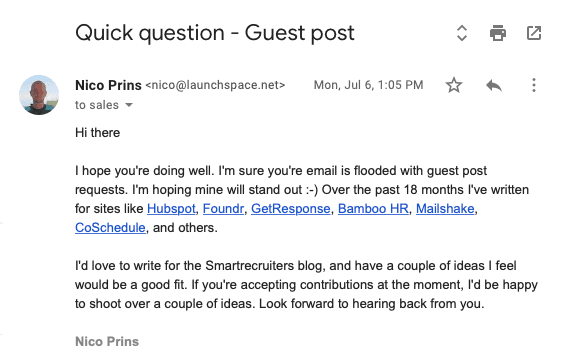
I've tried to find that balance between friendly and professional. I establish why they should consider my request.
Importantly, you'll notice that I didn't pitch an idea. Editors are busy people, and they get flooded with emails. Most don't respond to your inquiry. If you have to come up with a unique idea for each site that you email, you'll waste a lot of time. Instead, send an inquiry, then pitch to whoever responds.
How to Come Up with Guest Post Ideas
Coming up with guest post ideas is one of the hardest things about guest post outreach. I find it pretty easy. However, I've been doing this for a couple of years. Most people struggle to come up with ideas quickly.
Below are a couple of strategies I use to come up with ideas for guest posts:
Discover Keywords That Haven't Been Covered Yet
The first step is to do some keyword research for your target site. Using Google Keyword Planner, choose the "Start with a website" option and enter your target site. Keyword Planner will show you that site's top keywords:
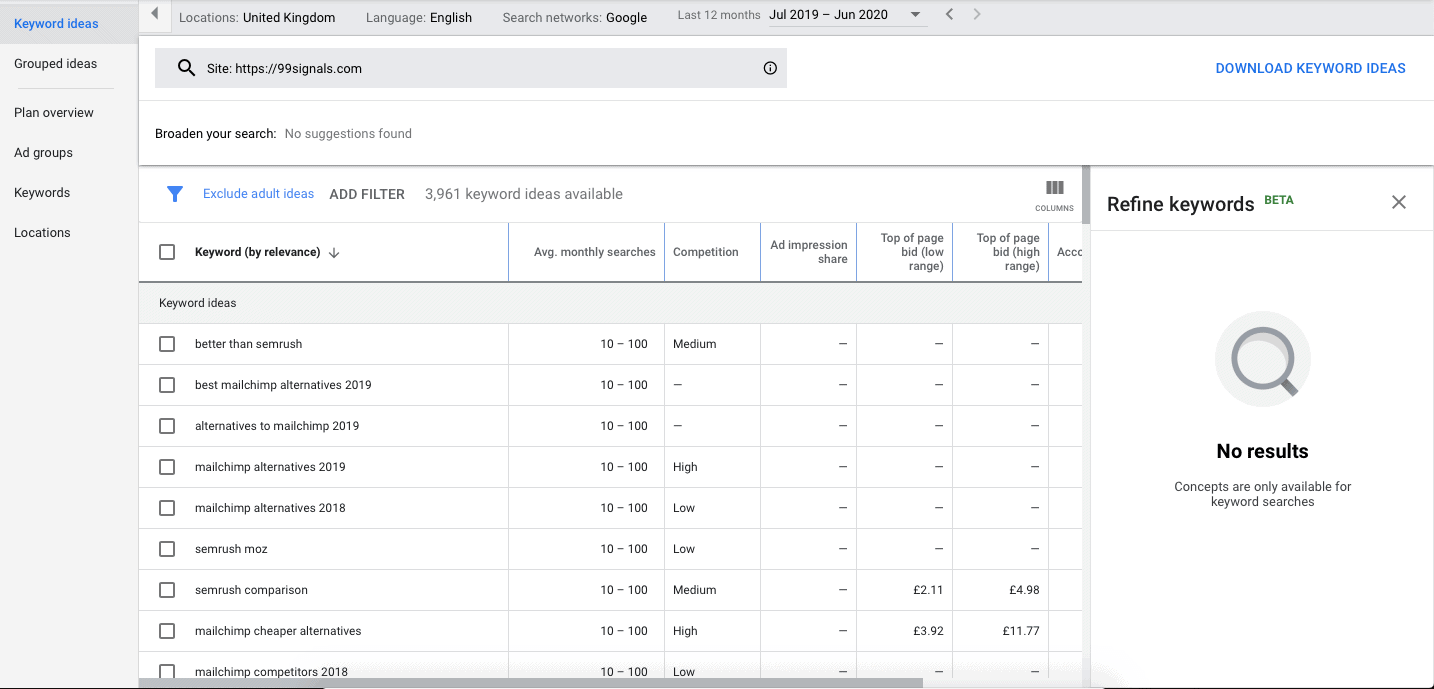
You can then use a free tool, like WMS Everywhere, which is a browser extension, to find relevant ideas related to these keywords. Here's an example.
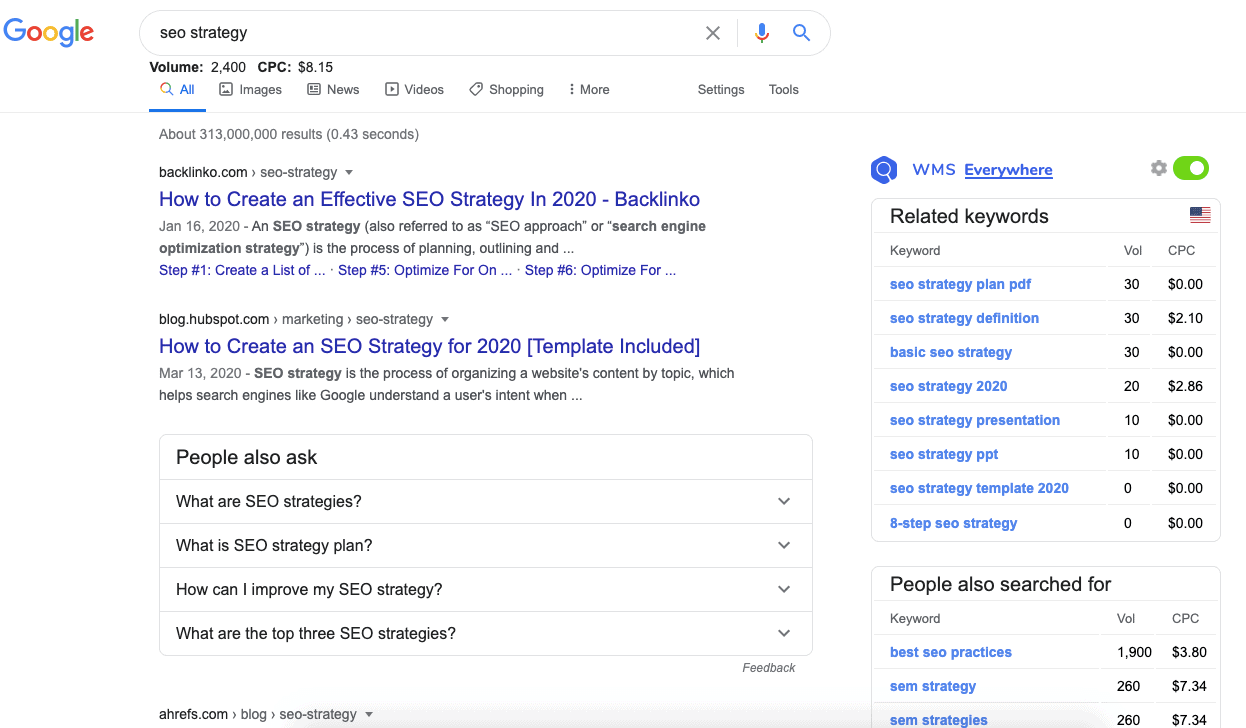
Finally, you can check if the site has written about the topic in the past. To do this, just enter the following formula on Google – site:website.com keyword
Let me give you an example.
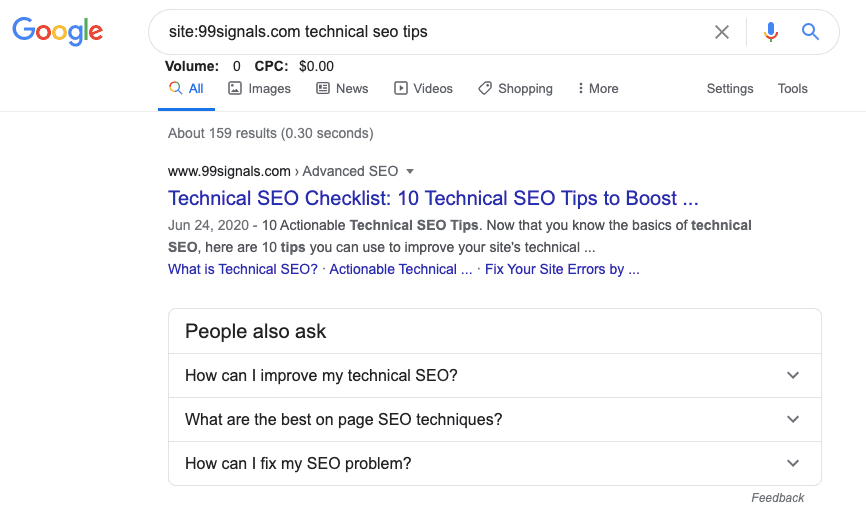
You can see that the keyword "technical SEO tips" has basically been covered on 99signals. So, you go back to the drawing board and find another idea. Repeat this process until you have three guest post keyword ideas that haven't been covered.
Check Out User-Curated Content
Curated content is a great source of inspiration for guest post ideas. In the blogging and marketing niche, I thoroughly recommend you check out the Zest App. They hand curate content, which is shared to their audience.
The nice thing about Zest is your ideas are double validated. First, you know the content you're looking at is good as it's been reviewed by a person. Secondly, you can see how many people found the article interesting and clicked on the content.
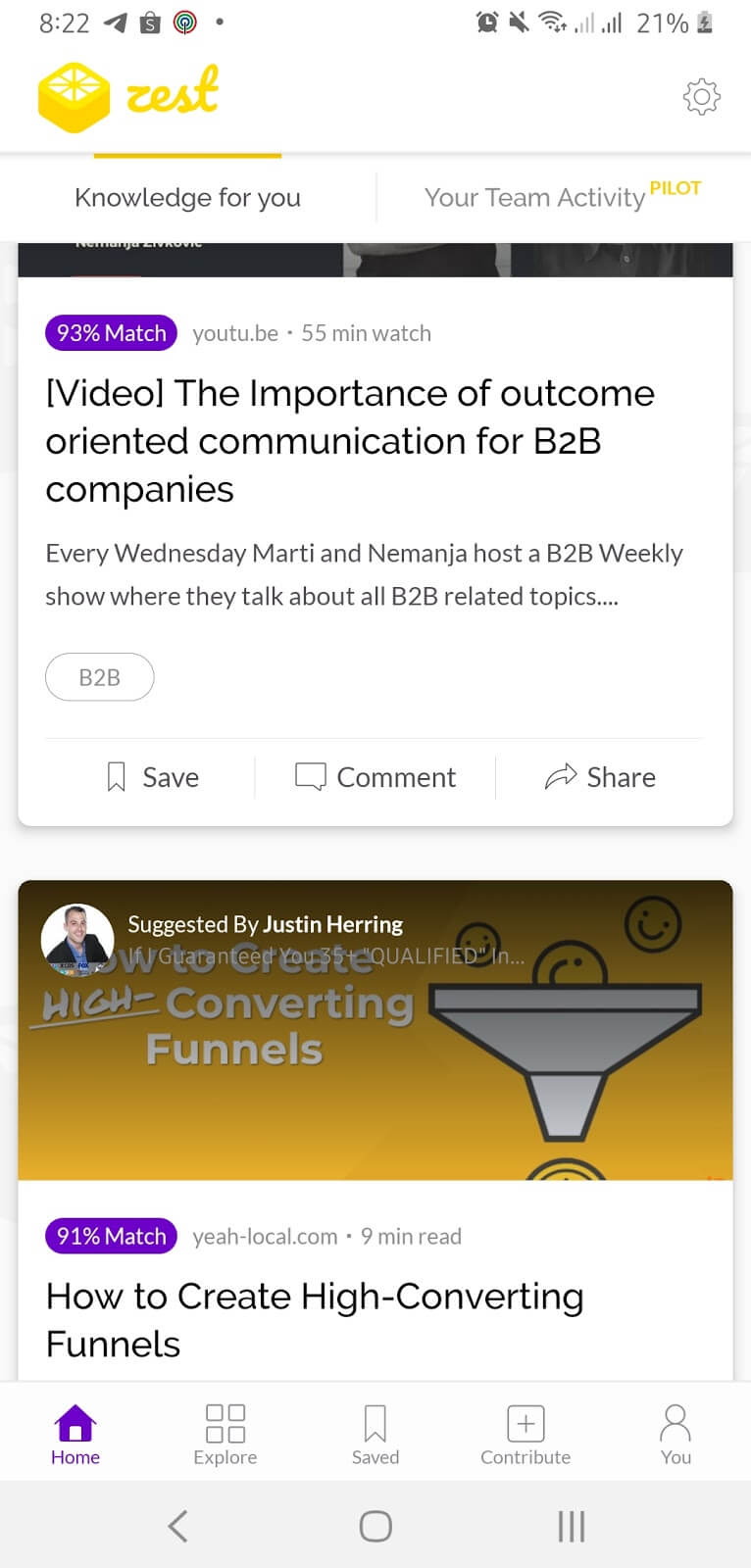
Try to find user curated content for the niche you're operating in. There are probably a few tools out there that curate content like Zest.
A good piece of content engages its readers and makes them feel compelled to share it with others. BuzzSumo is a useful tool that allows you to find relevant content with a high level of engagement, likes and shares on social media:
Check out the most popular content in your niche and see if your target site has anything similar. If not, go ahead and pitch them. As long as your copy is original, it's fine to take inspiration from existing content. In fact, it's the smart thing to do!
Recommended reading: How to Use BuzzSumo: 18 Actionable Ways to Use BuzzSumo
Get writing!
You might feel like celebrating when an editor accepts your pitch, but your work isn't finished yet. You promised an awesome piece of content. Now you have to deliver on that promise. In this section, I'll share my top tips for writing your article and making sure it gets published with minimal revisions.
Many websites have style guides. If your target site doesn't have one, ask the editor for their guidelines. Follow the rules to the letter. Ignoring them is the fastest way to get your article rejected.
Your content needs to be written in the appropriate tone and tailored for the site's audience. Read a few previously published pieces on the site and pay attention to tone, voice, and grammatical conventions. Then start writing.
Before you insert your backlinks, review the site's link building rules. Some sites allow you to use several backlinks in the article, while others allow them only in the author byline. Wherever you insert them, your backlinks should be relevant and add value.
Finally, review your article using a grammar checker. You'll be amazed at the number of mistakes you make. I use Grammarly to check my grammar, but there are plenty of good alternatives.
Scale your link building for maximum brand exposure
Link building remains a vital part of any SEO strategy, and guest posting is still the most effective way to do it. The earlier you scale your guest posting, the sooner you'll see your website climb the search rankings.
Guest posting seems daunting, but if you follow this process, you'll soon get the hang of it. Fortunately, there are many useful tools to help you evaluate the competition, find the right keywords, and come up with great topic ideas. And, as you scale up your efforts, you can hire people to take the time-consuming work off your hands.
Remember – guest posting is a marathon, not a sprint. You won't see results overnight, but you will experience long-term growth. So strategize, execute, and refine your strategies to find a process that works for you.
Here's to your first guest post!
If you liked this article, please share it on Twitter using the link below:
Editor's Note: This article was first published on 20 July 2020 and has been updated regularly since then for relevance, freshness, and comprehensiveness.
Related Articles

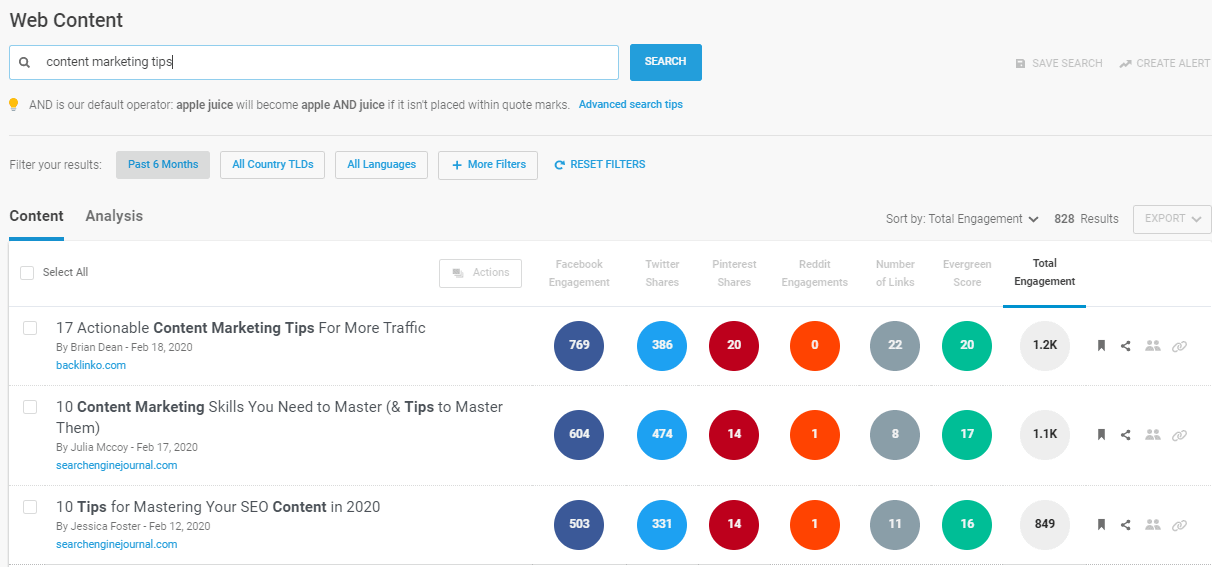









Hi Nico,
Your article is breathtaking; you just read and learn. It is a fantastic piece of content. The beauty of reading niche materials is that you learn as you read. Blogging calls for it, and I must say that even though I have been blogging for like there years ago, I just learned something new. WMS Everywhere is new to me. I first read about it in your article at Neal Schaffer but forgot it afterward. Now seeing it, here again, I decided to get the extension and run a quick check on it.
Thank you for sharing, and thank you too, Sandeep, for publishing!
Hi Moss. Thanks for the kind words about the post. WMS Everywhere is a good tool. I prefer Keywords Everywhere marginally, but they both provide great insights. Hope you have a great day.
Your stuff is incredibly valuable! You are quickly becoming my go-to for SEO! Cheers.
Hi Rohtak,
Glad you thought it was agood post. Best of luck with your guest posting efforts.
Loved the way you explained the whole outreach process. I do the outreach for one of my websites for the last 2 months and I have got a few quick questions.
1) I use my personal email for outreach. Is that good or I should use a business email?
2) 99% of the webmasters ask for the money. How to deal with them in such cases?
Thanks
Hi Hanna. Thanks for the kind words. Let me address those two points you raised:
1) I use my personal email for outreach. Is that good or I should use a business email?
I recommend using a business email over Gmail. It's not a deal-breaker, but it looks more professional.
2) 99% of the webmasters ask for the money. How to deal with them in such cases?
First off, selling links is prevalent across most niches. In some niches, it can be next to impossible to secure legitimate links through white hat outreach. It's a pain, and you'll have to deal with it. Probably not the answer you were looking for :-/
In terms of tips, you can try and offer something instead of money for a guest post opportunity. I've got round paying for links in the past by offering a link from an upcoming guest post in exchange for a guest post opportunity. Some website owners will be happy to do this (say 1 in 20 sites). Make sure to check what kind of links they are offering though. If they charge for posts and have a "special price" for casino links and similar then stay away.
Thanks for the detailed answer, Nico. I got the idea. I always reject links from sites that offer casinos, and gambling links even if they offer me a free do-follow link. So that another topic.
One last question in my mind is if I get a link from a site and give a link in exchange (from the same site), will google catch this? I've watched a few videos from Ahrefs about exchanging links and they give a green signal about it (means google don't mind link exchange). What are your thoughts on this?
No worries. With regard to your last question, I'd be careful about link exchanges. If you're using link exchanges to improve your search rankings, which let's be fair everyone is, then it's against Google's guidelines.
I'd suggest pushing for indirect exchanges. For example, I'll get you a link from an upcoming guest post or similar, and you link to me from your site. This mixes things up a bit.
Hey Nico, great article. I have a question.
Can I guest post on one particular website two to three times a month? And should I do that from one particular email id, like my own email id?
Hi Ujjaini,
Thanks for the feedback. Hope it provides some practical insights for your own outreach. So, question… 🙂
The more links you get from a site, the less valuable the links. It's like a recognition that you can land the links at any time you want. For this reason, I generally wouldn't recommend writing multiple posts a month for the same site unless there's another business goal attached to the initiative. For example, customer acquisition or something. I hope that makes sense.
I came across your article by chance and just had to read it when I saw the title. I like the fact that it's more practical than a lot of articles on this topic and you actually describe some of the nuts and blots of what you do. For me the challenge is to actually find enough guest posting opportunities and for them not to be asking for payment.
Thanks heaps for the insights!
Hi there.
Really interesting post. How do you guys convince website owners to let you post something on their website? I find it really hard. They either don't do it or ask for money 🙁
Any tips?
Cheers
It is about having the right writers in your team so you can work with them.